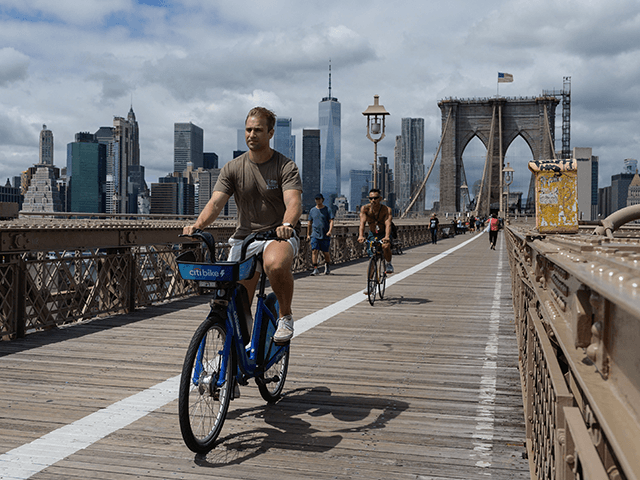Vehicles traveling toward Manhattan on the Brooklyn Bridge reportedly move at a slower pace after a lane was handed over to cyclists.
The information comes from data gathered by analysis firm INRIX that found traffic throughout March progressed at approximately 19.5 miles per hour (mph), the New York Daily News reported Sunday.
That number reportedly dipped 28 percent from 27 mph in the same month of 2019.
“City officials under former Mayor Bill de Blasio opened the bike lane last September. It was one of the de Blasio administration’s last major cycling projects, and aimed to address an sharp increase of bike trips over the East River bridges during the pandemic,” the News article read.
Meanwhile, some e-bike brands and merchants across the nation said sales have increased with many pointing to the rising fuel prices, Bloomberg reported March 18:
At Dutch e-bike maker VanMoof, sales over the past few weeks have been twice as high as the company’s projections. “We’re attributing that to rising gas prices,” says VanMoof co-founder and chief executive officer Taco Carlier in an email.
Gregg’s Cycle, one of the largest bike retailers in the Seattle area, just had its best February since it opened in 1932. “It was across the board, but e-bikes were a big percentage of that,” says longtime general manager Marty Pluth. “I think that was a result of the fuel hikes.”
Many American citizens have placed blame on President Joe Biden’s administration for high fuel costs, according to a recent Emerson Polling survey.
“Biden has long refused to take responsibility for skyrocketing gas prices, blaming Russian President Vladimir Putin as well as gas and oil companies,” Breitbart News reported.
Per the News article, transportation analyst Charlie Komanoff expected “traffic speeds on the bridge to increase by about 15% once the Metropolitan Transportation Authority launches its congestion pricing program to toll motorists who drive south of 60th St. in Manhattan.”

COMMENTS
Please let us know if you're having issues with commenting.